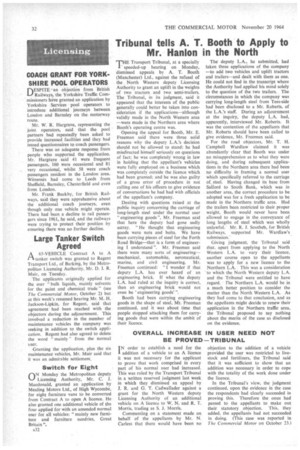Tribunal tells A. T. Booth• to Apply to Mr. Hanlon in the North
Page 34

If you've noticed an error in this article please click here to report it so we can fix it.
THE Transport Tribunal, at a specially 1speeded-up hearing on Monday, dismissed appeals by A. T. Booth (Manchester) Ltd., against the refusal of the North Western deputy Licensing Authority to grant an uplift in the weights of two tractors and two semi-trailers. The Tribunal, in its judgment, said it appeared that the interests of the public generally could better be taken into consideration if the applications—although validly made in the North Western area —were made in the Northern area where Booth's operating centre was.
Opening the appeal for Booth, Mr. E. Freeman said there were three solid reasons why the deputy L.A.'s decision should not be allowed to stand: he had misdirected himself seriously on questions of fact; he was completely wrong in law in holding that the appellant's vehicles were fully employed on a business which was completely outside the licence which had been granted; and he was also guilty of a gross error of procedure in not calling one of his officers to give evidence of conversations he had had with officials of the appellant's company.
Dealing with questions raised at the public inquiry concerning the carriage of long-length steel under the normal user "engineering goods ", Mr. Freeman said that here the deputy had gone sadly astray. "He thought that engineering goods were nuts and bolts. We have been carrying pieces of steel for the Forth Road Bridge—that is a form of engineering I understand ". Mr. Freeman said there were many sorts of engineering— mechanical, automobile, aeronautical, marine, and civil engineering. Mr. Freeman continued: "I wonder if that deputy L.A. has ever heard of an engineering brick. If what the deputy L.A. had ruled at the inquiry is correct, then an engineering brick would not even be 'engineering goods' ".
Booth had been carrying engineering goods in the shape of steel, Mr. Freeman continued, and it was about time that people stopped attacking them for carrying goods that were within the ambit of their licence.
The deputy L.A., he submitted, had taken three applications of the company —to add two vehicles and uplift tractors and trailers—and dealt with them as one. He could not find in the transcript where the Authority had applied his mind solely to the question of the two trailers. The circumstances in which the company was carrying long-length steel from Tees-side had been disclosed to a Mr. Roberts, of the L.A.'s staff. During an adjournment at the inquiry, the deputy L.A. had, apparently, interviewed Mr. Roberts. It was the contention of the appellants that Mr. Roberts should have been called to give evidence, Mr. Freeman said.
For the road objectors, Mr. T. H. Campbell Wardlaw claimed it was abundantly clear that Booth was under no misapprehension as to what they were doing, and during subsequent applications in the Northern area there had been no difficulty in framing a normal user which specifically referred to the carriage of steel. Having changed its base from Salford to South Bank, which was in another area, the correct procedure to be adopted was for a fresh application to be made in the Northern traffic area. Had the trailers been restricted to their proper weight, Booth would never have been allowed to engage in the conveyance of long lengths of steel which was wholly unlawful. Mr. R, J. Southeb, for British Railways, supported Mr. Wardlaw's submission.
Giving judgment, the Tribunal said that, apart from applying to the North Western L.A. to vary their licence, another course open to the appellants was to apply for a new licence to the Northern L.A. This was a consideration -to which the North Western deputy L.A. and the Tribunal were entitled to have regard. The Northern L.A. would be in a much better position to consider the matter than the North Western L.A. As they had come to that conclusion, and as the appellants might decide to renew their application in the Northern traffic area, the Tribunal proposed to say nothing about the merits of the case as disclosed on the evidence.




















































































































